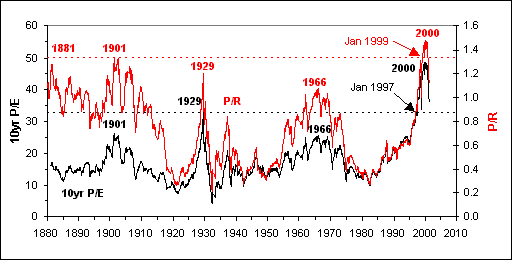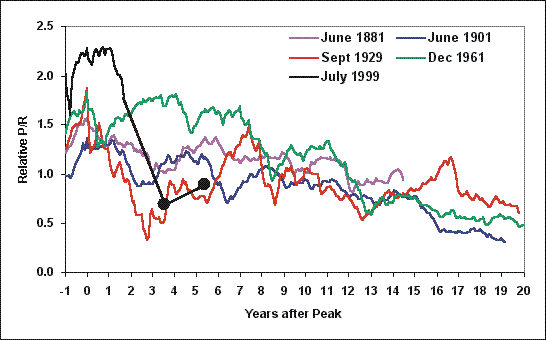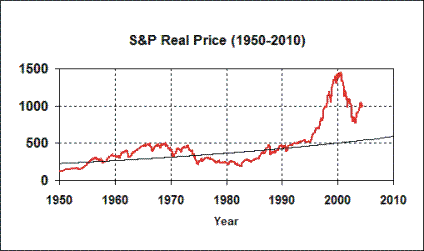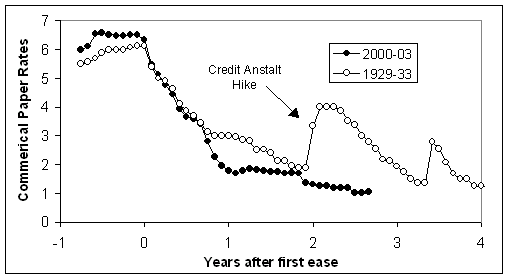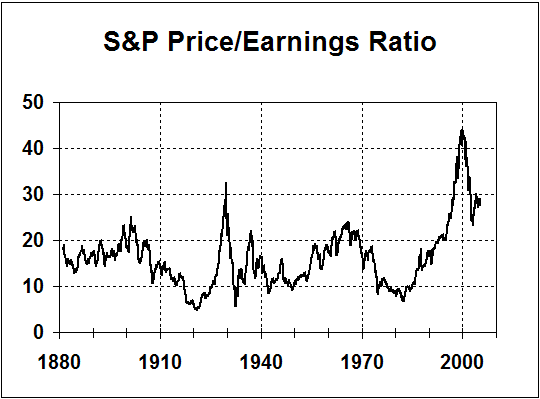Dear Sean,

Originally Posted by
Peter Gibbons
> I think this is true but only to a point. It goes both ways to a
> certain degree. I wholeheartedly disagree that Al Gore would've
> pushed through Bush's tax cuts. He may or may not have engaged in
> some kind of fiscal stimulus in light of the burst bubble, but he
> would not have engaged in anything that deep or relatively
> regressive (as he'd see it, anyway). As a result our current
> budget deficit wouldn't be as bad nor our current account
> deficit.
> But in support of your overall point, the Overconsumption Orgy
> would surely still be going on and still have a horrible end
> (which we still have yet to see). It just wouldn't have been quite
> as bad as it is now. But the same general consequences would
> apply. So in that sense I can see your concept of inevitability,
> but to say that Bush's tax cuts were inevitable is not something I
> see.
Before responding directly, I think it's worthwhile to pause and make
a point about Al Gore and George Bush. Both of them were the
"anti-Clinton." Bill Clinton was a brilliant politician, especially
in front of an audience, but he also in bed with drug dealers, he
convulsed the nation with his lies, he offended people with his
profligate sexual behavior, and he was credibly charged as a violent
serial rapist.
Both Al Gore and George Bush are the opposite. They're both stiff
and uncomfortable in front of an audience, they're both credible and
honest, and they're both devoted to their families. I see the two of
them as very similar.
Now I get it that you hate George Bush passionately, and you feel the
need to emphasize differences between him and Gore, even when no such
differences exist. But what you're doing is actually a disservice to
Gore. Since I think we can both agree that he's an honest man, then
that means we have to believe what he says. That means that if you
ascribe policies to Gore based on some fuzzy "intuitive" feelings that
you might have, and you can't support those views with Gore's actual
words, then you're actually attacking Gore's credibility. Gore was
and is fully able to speak for himself, and we don't have to depend
on feelings or intuition about what we'd like to believe that he
might have done.
Now, turning to your point, my recollection is that Al Gore proposed
any number of spending programs during the 2000 campaign, and I think
we have to take him at his word about those. You're right that he
wouldn't have pushed through Bush's tax cuts, but he
would
have pushed through spending programs for an equal amount of money.
The
zeitgeist in 2001 is that there was a lot of money around
to be spent, and that's what politicians do.
Politicians are really very simple-minded, really - as simple-minded
as dogs. If you put a pile of money in front of a politician, it's
like putting a steak in front of a dog -- they'll drool and bark and
whine and get their paws on every bit of it.
So Bush pushed through tax cuts and Gore would have pushed through
spending programs, but from the point of view of the macro economy,
there would have been no difference between them.

Originally Posted by
Peter Gibbons
> I am still not fully convinced that the Iraq War would've happened
> under Gore. I am, at least intuitively, pretty certain that it at
> least wouldn't have happened the same way. Gore wouldn't have been
> as fixated on getting Sadaam, no matter what. Bush had some kind
> of obsession there.
Now here there
is some difference, but in the opposite
direction than you suggest.
I followed the Iraq issue very closely in 2002. In January,
conservatives were pressuring Bush to invade Iraq, and were
predicting that we would do so in the Spring came. When Spring came,
the conservative pundits were predicting an invasion in the Summer.
In Summer, the predictions were for the Fall, then for the late Fall,
and then finally for early 2003.
In other words, there were several delays in the invasion timeline.
Bush could deal with those delays because the conservatives kept
mostly quiet, and because worldwide debate was mostly opposed to the
invasion, especially in the UN. Bush did achieve a significant
victory in the UN late in 2003, when he got that resolution passed
requiring Iraq to cooperate with the inspectors, but when Chiraq
double-crossed him and Dominique de Villepin stuck a knife in Colin
Powell's back, and Saddam refused to fully cooperate, Bush felt he
could go ahead, and he did, with the overwhelming support of the
Democrats.
Now, imagine the scenario with Al Gore as President.
Gore would have spent 2001 trying to push through his spending
programs. But 9/11 would have been very different for Gore.
Gore would have been fully blamed for 9/11. Bush almost completely
escaped blame, because he was in office only a few months. But Gore
would have been in office almost nine full years. He would have
received far harsher treatment from the Republicans than Bush got
from the Democrats.
Let's assume, for the sake of argument, that Gore would have pursued
the same sort Afghan war that Bush did, and let's move on to the 2002
scenario.
That year would have been a political crisis for Gore. The
Republicans would have been saying to Gore: "You and Clinton have
been disastrous for the country. You and Clinton let 9/11 happen,
exposing the country to the danger of Islamic terrorists. Now we're
facing the threat of WMD's from Iraq. You've been bombing Iraq for
nine years, but you haven't done anything to reduce the WMD threat.
You're a weak leader because you refuse to do anything to protect the
country. Every time you delay, then you put the entire country in
even more danger."
Every attempted delay by Gore would have been met with huge political
turmoil. Gore would not have been able to get away with five or six
delays the way Bush did. Gore would have had to invade in Spring
2003, almost a year earlier than Bush did.
So Gore would have had to be
much more militarily aggressive
than Bush was.
And if Gore
really tried to do what you "intuitively" claim he
would have done, then that would have been the real analogue to the
Herbert Hoover presidency, and Gore would have been thrown out by a
landslide in 2004.
Speaking of 2004, it's worthwhile mentioning one more point: There
was absolutely no difference in announced policy in Iraq between
Kerry and Bush. And if Kerry had won, then any talk of withdrawal
from Iraq would have led to the same kinds of harsh Republican
attacks that Gore would have received - the accusation that Kerry was
weak, and was putting the country in danger.
So forget about your "intuitive" feelings about Gore and Kerry. If
you can't find actual words or deeds to support your intuition, then
your intuition has no value that I can see.
America today is having its "Next Rendezvous with Destiny," to quote
the TFT front cover. That rendezvous is coming, it's coming soon,
and it will be much worse than the Great Depression and World War II,
and it makes absolutely no difference what politician is in power.

Originally Posted by
Leo Tolstoy in War and Peace
> In historic events, the so-called great men are labels
> giving names to events, and like labels they have but the smallest
> connection with the event itself.
That's the way it is. Maybe Bush will be blamed for what happens, or
maybe Bush will be labeled the next great President, following the
sequence Washington, Lincoln and FDR. But either way, Bush will
actually have had but the smallest, most insignificant connection to
the "clash of civilizations" world war, and the same would have been
true of Gore or Kerry, if either of them had been President.
Originally Posted by Sabinius Invictus
